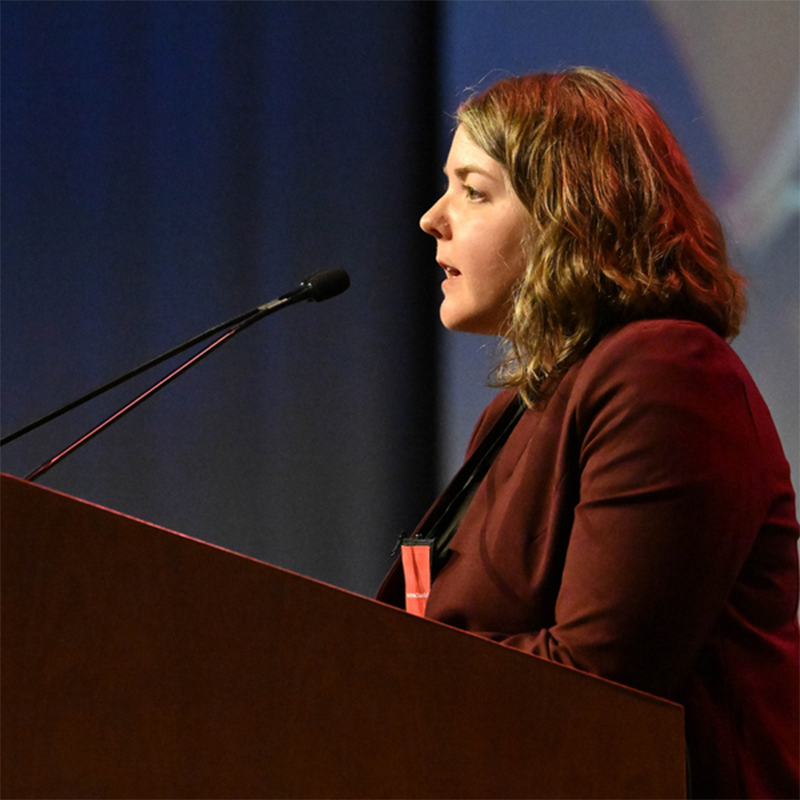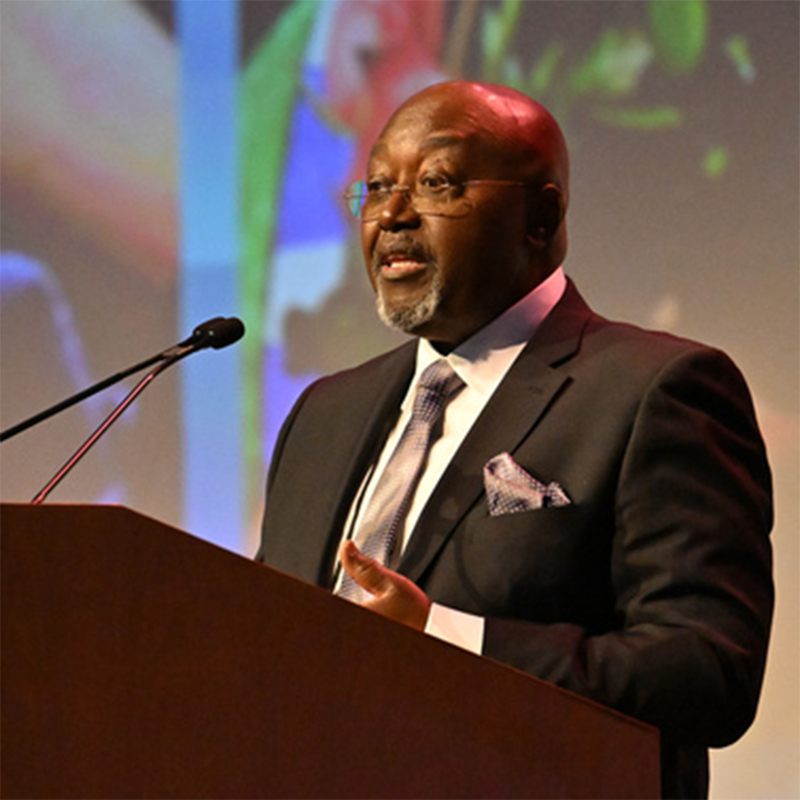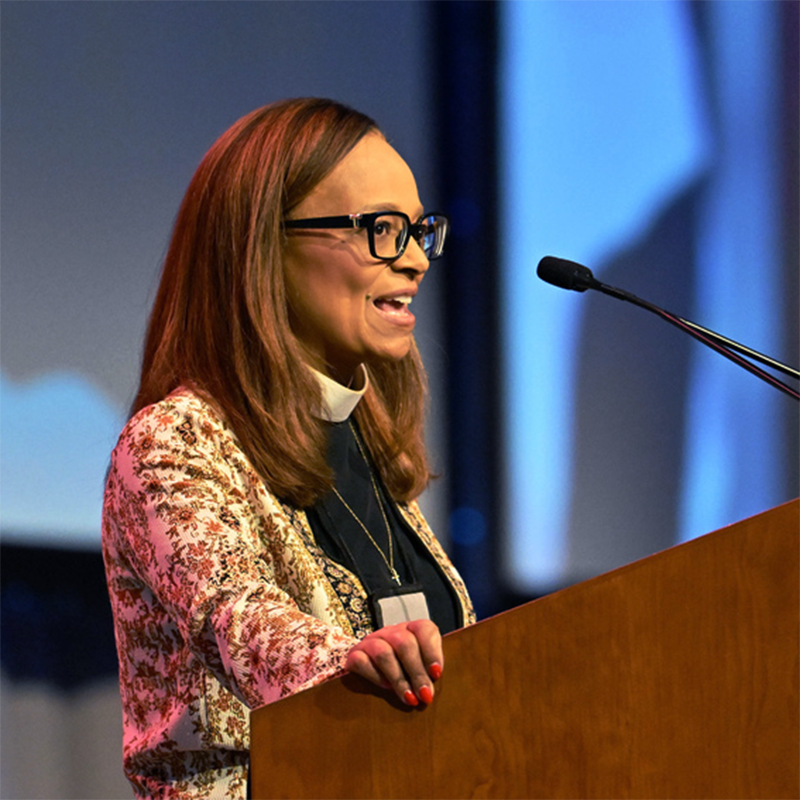
Katie Carter, MRTI lead staff. Photo by Rich Copley

Em Rau, Young Adult Advisory Delegate. Photo by Kristen Gaydos
In a surprise reversal, the 226th General Assembly made an about-face on Tuesday afternoon by deciding against complete divestment from the fossil fuel industry after having voted in favor of it that morning.
After tough and lengthy discussion, GA commissioners voted to disapprove ENV-02, the overture from the morning, and to instead go with an amended version of ENV-06. Among other things, it directs the Presbyterian Mission Agency’s Committee on Mission Responsibility Through Investment (MRTI) to immediately identify the top 10 fossil fuel companies that derive most of their profits from the exploration, development and production of fossil fuels and immediately divest from those companies.
The Rev. Heather Hayes, a teaching elder commissioner from the Presbytery of East Iowa, brought forth the amended version of ENV-06 that was approved with a minor word tweak. She called it a third way forward after having first sided with Young Adult Advisory Delegates on the Environmental and Climate Justice Committee who were eager to divest out of concern for the planet and then her being influenced by opposing groups, such as the Racial Equity Advocacy Committee and MRTI.
“I still care deeply about the urgency which has been so movingly expressed by the other members of the committee, and the YAADs, and the many people who have spoken here today. And so, I encourage us to perhaps, while still supporting and continuing the work of MRTI, also encourage them in that urgency” to immediately divest from the top 10, she said.
Katie Carter, MRTI lead staff, pointed out a few flaws with the proposal but also gave it a boost by saying, “This might be a good compromise for how we can fill in some of the holes in MRTI’s work but also make a statement and also allow us to continue” with some engagement.
The measure was approved despite passionate comments by people like YAAD Em Rau, who talked about the fossil fuel industry’s negative impact on their state of West Virginia.
“I have watched the coal industry ravish my state … literally pulling the mountains apart to ending any chance for generational wealth for the people, and I urge you, I'm begging you, begging you, commissioners, to listen to the YAADs,” they said. “We don't have a future if there is no planet, and if we are the future, can you listen to us in the present, please?”

Samuel Roberts, Environmental and Climate Justice Committee moderator. Photo by Rich Copley

Kerri Allen, MRTI chair. Photo by Rich Copley
Earlier that afternoon, the stage was set for debate when Environmental and Climate Justice Committee Moderator Samuel Roberts introduced ENV-06 near the beginning of the plenary and asked for MRTI to come forward to address the report.
MRTI had initially filed the report in response to the previous General Assembly to signal MRTI’s desire to continue engaging with certain fossil fuel companies and to recommend selective divestment as a final straw. But ENV-06 got changed in the ENV committee (see previous story).
Taking the stage on Tuesday afternoon, MRTI Chair the Rev. Kerri Allen acknowledged the urgency of the climate crisis and noted how hard the ministry works for substantive change, then began pointing out flaws in both ENV-06 and ENV-02. Chiefly, she noted that agencies that actually do the investing might have trouble implementing ENV-06 because of changes made to it by the ENV committee while trying to reconcile it with ENV-02.
She went on to say, “This disrupts MRTI’s bridge building with faith- and values-based partners, signaling to communities like the Indigenous partners in the Louisiana bayou, and this morning’s vote means that MRTI walks away from (the local) request to facilitate cooperation with ConocoPhillips,” she said. “With the passing of ENV-02 and the added language in ENV-06 about divestment, MRTI would cease engagement, losing the ability to file shareholder resolutions and strategically influence corporate board elections. This means that we lose our seat at the table of Climate Action 100, which leverages trillions of dollars to bring about actual change.”
The commissioners also heard from Sue Smith of the Advisory Committee on Social Witness Policy (ACSWP), who said that the “General Assembly basically bypassed ACSWP and its ability to make policy,” leaving MRTI in a bind.
After some discussion, the Rev. Tully Fletcher, a teaching elder from the Presbytery of Greater Atlanta, called for reconsideration of ENV-02, noting that he had voted for it before lunch but now felt that more information was needed on the implications of ENV-02 and ENV-06, given the lack of policy on fossil fuels from ACSWP and MRTI’s comments.
Eventually, discussion on ENV-06 was suspended so that another vote could be taken on ENV-02, the measure from the morning. Later, a vote to approve ENV-02 failed 198 to 225. Commissioners were then asked, at the request of Acting Stated Clerk Bronwen Boswell, to take a vote on disapproving the motion, and the commissioners voted 264 to 146 in favor of the disapproval.
The lengthy discussion necessitated amending the docket to move the Polity Committee’s business, which had been scheduled to be heard on Tuesday afternoon, to Wednesday morning.
A brief presentation was given on the business of the Mid Councils Committee, which was approved by consent agenda. (Find more information about that business here.)
